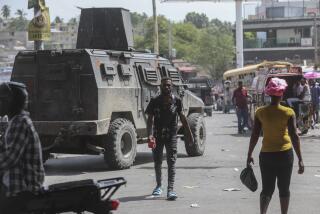Tension Mounts as Somalis Await Forces’ Arrival
- Share via
MOGADISHU, Somalia — Until recently, United Nations cars were among the most prominent and secure vehicles on the streets of this anarchic capital, their trademark blue U.N. flags flapping from their antennas.
No longer. With U.S. Marines poised offshore to begin their mission to restore order to this country, U.N. officials are so worried they may be singled out for revenge by disenfranchised gunmen that they have exchanged their blue banners for a more innocuous design featuring blue letters on a white background.
For hired security guards and armed looters alike--anyone who has profited from brandishing weapons in Somalia--the impending arrival of the troops is a dismal prospect. As Somali gunmen and warlords realize that their chaotic reign may soon end, tension and violent incidents are beginning to mount.
Friday night in Baidoa, the epicenter of the Somali famine, gunmen attacked the compound of CARE International, stealing Somali shillings worth about $20,000 and firing into the compound. According to relief workers in Baidoa, CARE evacuated four expatriate workers from the town Saturday after receiving a warning from Somali staff members that another raid was planned.
That followed several incidents Thursday, the day the U.N. Security Council voted to send a U.S.-led military force to pacify the country. In one case, four looters tried to steal a vehicle from the U.N. World Food Program’s compound here, setting off a firefight in which one Somali food program guard was injured and one looter shot dead.
Throughout the country, scores of foreign relief workers have been warned by warlords that they could become targets of shooting and kidnaping by the gunmen they now employ for “protection,” many of whom will be made jobless by the American advance. A simple, bloodless transfer of power from Somali “Rambos” to U.S. Marines may prove impossible.
Relief workers who know Somalia well fear the tension will continue to increase until the troops arrive. This sentiment is visible on the notice board of the World Food Program, which lists relief ships due to arrive at Mogadishu port. It now reads: “U.S. 6th Fleet. ETA-ASAP.”
One test of wills may come today, when two convoys loaded with food will try for a second time to leave the port of Mogadishu, bound for north Mogadishu. The convoys’ departure was originally scheduled Saturday, but an agreement by squabbling warlords to let the trucks through broke down at the last minute. If they go today, the convoys will be the first to exit the port since Nov. 11, when a similar shipment was hijacked outside Baidoa and up to 40 of its guards were killed.
Still, most people in Mogadishu are in the dark about the timing of the Marines’ landing--even the United Nations’ senior military officer in the country, Pakistani Brig. Gen. Imtiaz Shaheen.
“We have had no communication from the Americans or the U.N.,” said Shaheen, commander of a force of 500 Pakistani soldiers that has been largely unable to deploy to protect Mogadishu’s airport and the seaport since its arrival early in October.
(Other sources told The Times that the U.S.-led mission is unlikely to begin before early Tuesday local time, which is late afternoon Monday PST.)
Shaheen, who had earlier criticized plans for massive foreign military intervention in Somalia, now acknowledges that the operation could be successful and that his own force is too small and had an ill-defined mandate.
“Now things will change,” he said. “This is a fully armed mobile combat unit, with a combat mission and the U.N. behind it. Look at me. I have not even a peashooter.” Some observers believe that the Somalis look down on the Pakistanis but are likely to defer much more readily to sophisticated Western troops.
“Somalis tell me all the time about the U.N. (troops), ‘Don’t bring these Third Worlders, because they are hungry like we are,’ ” said a Westerner who has lived in Somalia almost 10 years. “ ‘We trust the Americans because they don’t want anything from us.’ ”
More to Read
Sign up for Essential California
The most important California stories and recommendations in your inbox every morning.
You may occasionally receive promotional content from the Los Angeles Times.










